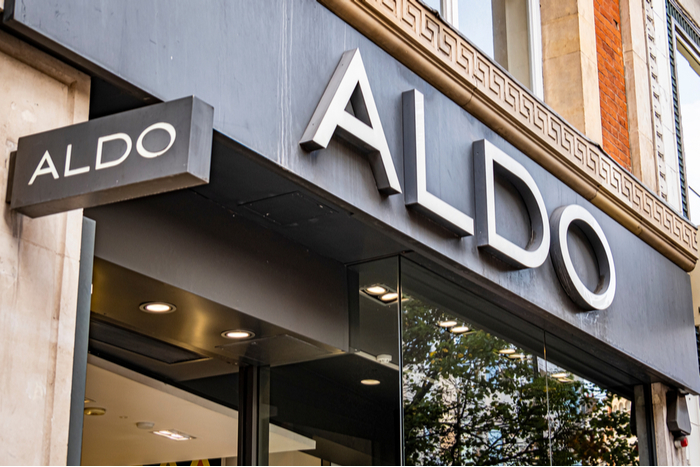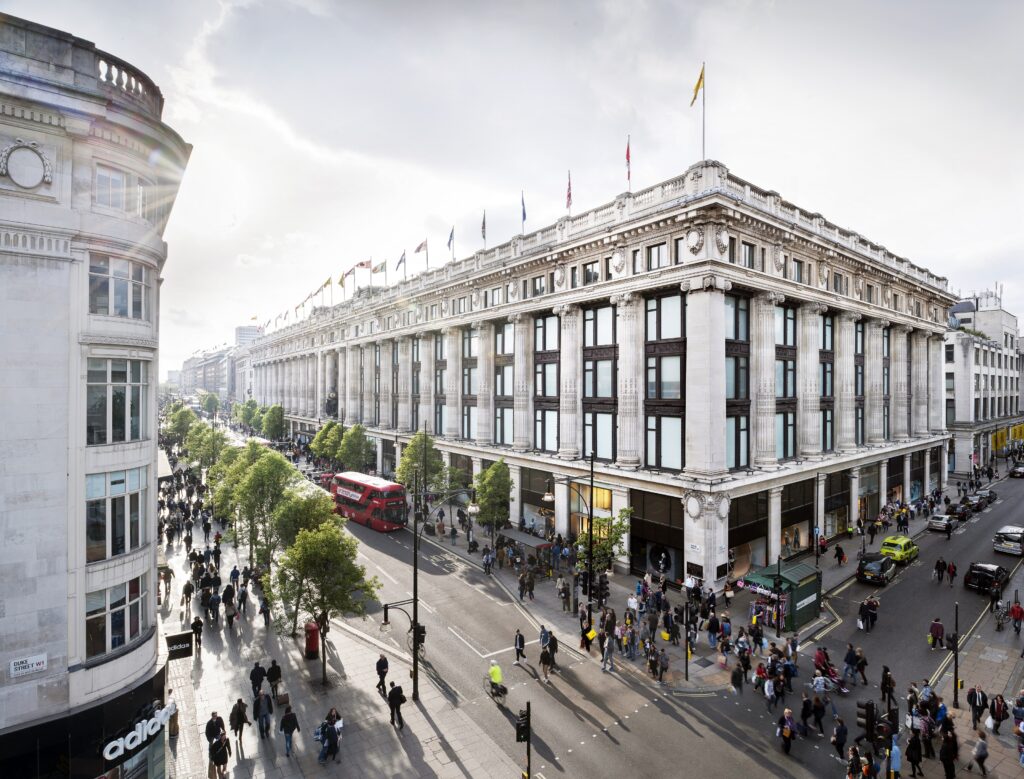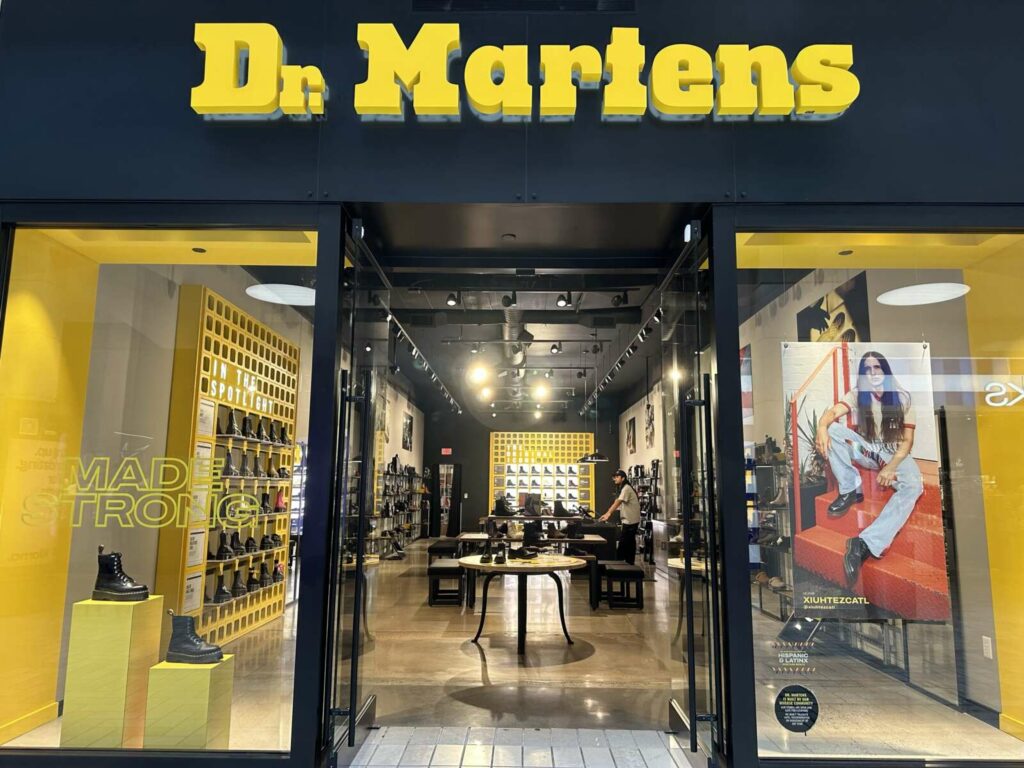A BRIEF TIMELINE
1972: Aldo Bensadoun, son of a shoe merchant, founded Aldo Shoes as a footwear concession within a chain of fashion boutiques in Montreal, Canada.
1978: The first standalone Aldo store opened on St Catherine Street in Montreal, ending the practice of leased departments within the chain of clothing fashion boutiques.
1985: Aldo became the first retailer to team up with an AIDS charity with its new ‘ight AIDS campaign to support the fight against the illness.
1991: Aldo opened its 200th store.
1993: Aldo entered the US market with the first store opening in Boston.
1995: Aldo announced plans to further expand. The first store outside of North America opened in Israel.
1996: Aldo launched its Feetfirst collection, which catered to an older clientele.
2000: Aldo launched an accessories collection.
2001: Aldo opened its first store in Saudi Arabia.
2002: Aldo opened its first UK store in London. It then opened in London’s prime locations on Neal Street, Camden, and Kensington, as well as moving towards the countryside including Basingstoke, Uxbridge, Croydon, Kent & Southampton.
2003: Aldo opened its first store in Asia in Singapore.
2005: Aldo launched its first transactional websites for US and Canada.

2010: Bensadoun learned Italian to better communicate with his suppliers in Italy, and eventually cut out the middleman who serviced him between Canada and European manufacturers.
Meanwhile, Aldo launched a new division called Aldo Product Services, which is tasked with transforming the footwear retailer into an industry-recognised wholesale distributor and third-party sourcing provider of fashion footwear and accessories.
Aldo also introduced a new store concept called Lōcale in Canada, which would replace the current Feetfirst stores. Lōcale is a footwear and accessories boutique-style concept store aimed at young professionals.
Aldo announced a major expansion in the US during the same year. The retailer joined forces with US department store chain JCPenney to launch the Call It Spring brand which would sell as a shop-in-shop concept across JCPenney stores.
2011: Aldo announced it was partnering with Kohl’s department stores to design and produce exclusive footwear which would be sold under private and exclusive brand names.
2012: Aldo celebrated its 40th anniversary in the footwear and accessories sector by throwing a series of installations and events, including a special pop-up exhibit at its flagship Montreal store.
Aldo was accused of paying its factory workers in Los Angeles under minimum wage by the US Department of Labor.
2014: Aldo chief executive Réjean Dionne stepped down from his duties after 27 years with the company. He was replaced by Under Armour chief executive Patrik Frisk.
2015: Aldo launched a mobile app in Canada and the US.
2017: Aldo Bensadoun’s son David Bensadoun was appointed chief executive of Aldo, replacing Frisk.
2018: Aldo became the first fashion footwear and accessories retailer to be certified as climate neutral for its corporate stores, offices, and distribution centres.
Between 2013 and 2018, the company achieved a 46 per cent reduction of its greenhouse gases.

2019: Aldo has over 3000 stores around the globe, operating on all continents.
2020: On May 11, Aldo filed for bankruptcy protection under the Companies’ Creditors Arrangement Act (CCAA) in Canada in a bid stabilise the business.
The retailer said court restructuring process began a week earlier and it was seeking similar protections in the US and in Switzerland.
Aldo said it was pursuing these measures to help it stabilise the business in response to the ongoing Covid-19 pandemic that has shut its stores outlets amid lockdowns. EY had been appointed as the monitor in the Canadian proceedings.
The retailer also stated it would “carry on business” with its ecommerce websites.
On May 18, Aldo exited Ireland after ceasing shipping orders and closing its ecommerce site in the country amid plans to wind down its Irish business. The Irish operation consisted of four stores in Dublin, including one at Dundrum Town Centre, as well as an ecommerce division. Aldo said the decision was “necessary based on the impact of the Covid-19 pandemic”.
On June 1, Aldo’s UK arm followed the footsteps of its North American business and filed for administration due to the impact of the pandemic. Professional services firm RSM were appointed as administrators, and have been exploring “future options” for eight Aldo stores in the UK while permanently closing the remaining five.
An exact number of how many jobs will be affected is not yet clear. Aldo said customers in the UK would still be able to shop Aldo online and concessions via Asos and Amazon or in department stores once those stores reopen.
THE REASONS
The news that Aldo’s UK arm would soon be filing for administration loomed after the retailer posted a loss of £5.4 million in 2019 on sales of £29 million. It had also already shut four underperforming stores in the UK last year.
The footwear retailer had many concessions and with department store chains such as House of Fraser and Debenhams were notably struggling even prior to the pandemic, they may have added to Aldo’s woes.
Moreover, it appears that Aldo was not alone in its struggle, as even before the pandemic, with the consolidation of the market, many specialist footwear retailers were in difficulty. Shoe retailers Clarks, Office and Schuh all reported a drop in sales. While many of them were undoubtedly badly hit during the pandemic, they also endured a collapse in consumer confidence and retail spending before it.
Nelson Blackley, a research associate at Nottingham Business School, was doubtful that any of the remaining eight Aldo stores in the UK would stay open. Especially since the process of customers trying on shoes in-store brings with it operational challenges that will need to be overcome in a post-coronavirus lockdown market – as well as the associated costs to ensure this can be done safely.
He added that a more “likely future strategy” for Aldo in the UK would be to focus on their online operation.
“Aldo may have suffered from a lack of market penetration and share”
An Aldo spokesperson told Retail Gazette that the administration was “necessary based on the impact of the Covid-19 pandemic, as well as historic profitability challenges and the unprecedented collapse in retail spending in the UK and globally”.
“The administrators anticipate maintaining eight stores as they look to explore future options for the company,” they added.
Rick Smith, managing director of business management consultancy Forbes Burton, argued that Aldo’s downfall came after it reported loss after loss in its business.
“Profitability challenges were also a key factor, after all, balancing low sales because of lower spending on the high street with the cost of brick and mortar stores is always a challenge and is remaining one as we progress into 2020,” he said.
“Aldo may also have suffered from a lack of market penetration and share. This, combined with a lack of distinct brand perception or awareness may be the reason why we are seeing them and similar retailers suffer.”
Smith added that the pandemic was likely part of the final straw after a period of challenges, and that the ongoing lockdown restrictions and medical advice would have not helped matters.
Nevertheless, considering that Aldo has been in the UK since 2002, it may still have a place in the market and a customer base.
However, as footfall continues to decline, Aldo must establish a cost-effective way to provide a physical presence to its customers – for example, reducing the number of independent stores and increasing its presence in department stores such as Selfridges and John Lewis. Or perhaps the other way around, given the plight of department stores at the moment.
“For Aldo to maintain and increase sales, they must improve the customer online experience”
Selfridges head of programme management consultancy services Sabrina Benjamin argued that due to the reduction in footfall year-on-year, consumers were spending more money online.
However, multichannel is a competitive space. Retailers with no brick-and-mortar presence have a lower cost to serve and more flexibility to reduce the cost of goods to the customer.
Benjamin added that “for Aldo to maintain and increase sales, they must improve the customer online experience”.
“Additionally, being clear on their values will keep and gain the increasing conscientious customer,” she told Retail Gazette.
She also said that consumer brand loyalty has decreased over the years, and retailers have to do more to win new and retain existing customers.
“It is important to point out the cost to retain a customer is significantly lower than to win one,” she said.
“As Aldo UK stores goes into administration, they need to create an approach on how they will retain their UK customers via their online offering.”
While there is every possibility for Aldo to have a future in the UK, it mostly depends on whether a buyer can be found for the remaining eight stores. If not, then it may become an online-only retailer, following the likes of Cath Kidston and Karen Millen.
Click here to sign up to Retail Gazette’s free daily email newsletter

















